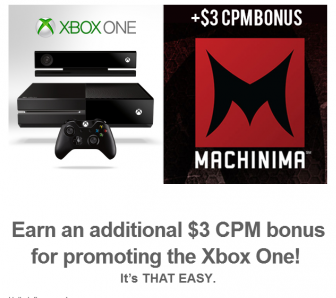
Update 2 (9:04 p.m. Eastern, Jan. 21): Microsoft has amended its statement on this matter with the following additions that seem intended to distance the company from these kinds of undisclosed marketing payments:
"Microsoft was not aware of individual contracts Machinima had with their content providers as part of this promotion and we didn’t provide feedback on any of the videos. We have asked Machinima to not post any additional Xbox One content as part of this media buy and we have asked them to add disclaimers to the videos that were part of this program indicating they were part of paid advertising.”
Update (1:55 pm Eastern, Jan. 21): Machinima and Microsoft provided Ars Technica with the following joint statement on this story.
"This partnership between Machinima and Microsoft was a typical marketing partnership to promote Xbox One in December. The Xbox team does not review any specific content or provide feedback on content. Any confidentiality provisions, terms, or other guidelines are standard documents provided by Machinima. For clarity, confidentiality relates to the agreements themselves, not the existence of the promotion."
Original story
The line between traditional, paid advertising and organic editorial content on the Internet can sometimes be hazy. A recent stealth promotional campaign between Microsoft and Machinima highlights just how hazy that line has become, and how behind-the-scenes payments can drive ostensibly independent opinion-mongering on by users on services like YouTube.
This weekend, word started leaking of a new promotion offering Machinima video partners an additional $3 CPM (i.e., $3 per thousand video views) for posting videos featuring Xbox One content. The promotion was advertised by Machinima's UK community manager in a since-deleted tweet, and it also appears on Machinima's activity feed on Poptent, a clearinghouse for these kind of video marketing campaigns. The Poptent page also mentions an earlier campaign surrounding the Xbox One's launch in November, which offered an additional $1 CPM for videos "promoting the Xbox One and its release games."
To qualify for the campaign (and the extra payments), Machinima partners had to post a video including at least 30 seconds of Xbox One game footage that mentioned the Xbox One by name and included the tag "XB1M13." A YouTube search for that relatively unique term turns up "about 6,590 results," but a quick scan of those results shows only a few hundred that actually seem to be tagged for the Machinima promotion.
These kinds of payments aren't inherently suspect in and of themselves. If the video makers disclosed that Microsoft was paying extra for these videos, and if they were allowed to say whatever they wanted in those videos, then the whole thing could be seen as merely an unorthodox way to increase exposure for the Xbox One on YouTube.
That's not the case, however. According to a leaked copy of the full legal agreement behind the promotion, video creators "may not say anything negative or disparaging about Machinima, Xbox One, or any of its Games" and must keep the details of the promotional agreement confidential in order to qualify for payment. In other words, to get the money, video makers have to speak positively (or at least neutrally) about the Xbox One, and they can't say they're being paid to do so.
The arrangement as described might go against the FTC's guidelines for the use of endorsements in advertising, which demand full disclosure when there is "a connection between the endorser and the seller of the advertised product that might materially affect the weight or credibility of the endorsement." The document offers a specific example of a video game blogger who gets a free game system that he later talks about on his blog. That blogger would need to disclose that gift, the FTC says, because his opinion is "disseminated via a form of consumer-generated media in which his relationship to the advertiser is not inherently obvious." That same reasoning would seem to apply to the opinions expressed by the video makers participating in this promotion. Neither Microsoft nor Machinima responded immediately to a request for comment on the matter, but we'll let you know if and when we hear from them.
This kind of guerrilla online video advertising doesn't seem to be a major part of Microsoft's Xbox One marketing plan. According to the Machinima e-mail, Microsoft agreed to pay only for the first 1.25 million views in the promotion, putting the budget paid to video creators at a mere $3,750 (it's unclear if Machinima itself received any additional funds for facilitating the promotion). Poptent lists the campaign, which started on January 14, as "expired on January 16," suggesting that Microsoft has already reached that desired video view goal. That money may be pulling more than its weight, though, as those videos continue to attract additional views that Microsoft doesn't have to pay for directly.
Whatever you think about the practice, there's reason to believe this kind of stealth promotion of "consumer-generated media" is likely to get more popular going forward. As readers and viewers get better at ignoring explicit, traditional ads—or start blocking them entirely with browser-side scripts—marketers are going to continue to try finding new ways to get their message out there through supposedly unbiased content creators. Something to keep in mind the next time you watch a video or read something from someone who says they're just an average, everyday consumer.
reader comments
169